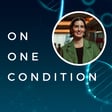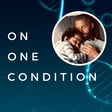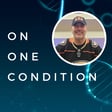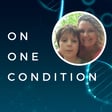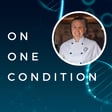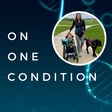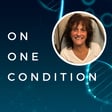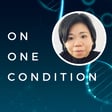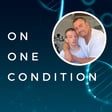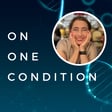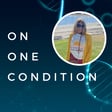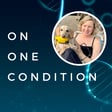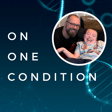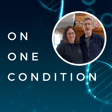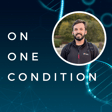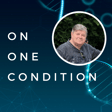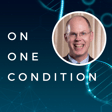Become a Creator today!Start creating today - Share your story with the world!
Start for free
00:00:00
00:00:01

Episode 41: Megan Starshak - Ulcerative Colitis
Megan was diagnosed with ulcerative colitis at 18 years old. Although she was diagnosed relatively quickly, what followed was a 6-year battle to find a doctor that would give her the attention she deserved. During that time, her quality of life went downhill, losing the ability to practice the sports she loved and losing some friends along the way. We discuss the voice of the patient in this interview, as Megan has taken part in Crohn's and Colitis Foundation's Day on the Hill twice.
The song Megan selected is You Will Be Found from the Broadway musical Dear Evan Hansen.
Transcript
Introduction and Guest Background
00:00:00
Speaker
Hi, I'm Silva Matero, and you're listening to On One Condition, a podcast to raise awareness about health conditions by listening to people who leave them every day. My guest today is Megan Starshak, and we're going to talk about ulcerative colitis. Hi, Megan. Thank you for joining me on the podcast. How are you doing? Good. Thank you so much for having me. I'm very excited. Me too. And very excited to hear about your song, which is always what we start with. So could you tell me what your song is and why you chose that one?
00:00:37
Speaker
The song I chose is You Will Be Found from the Broadway musical Dear Evan Hansen. And it's about when you are struggling and feeling invisible, finding yourself, having your community recognize you. um And it's very it's it's very uplifting. And i I am a volunteer counselor at the camp for Crohn's disease and ulcerative colitis, where I live. and We used the song in our camp video one year and I've watched that video maybe a hundred times and it always brings back those um those good memories. ah It sounds like it's very appropriate for this sort of thing, so I completely get that. I don't know the song myself, but I'll try to find it and listen to it.
00:01:26
Speaker
you can You can at least find it on on YouTube. Yes. Give it a good listen. Yeah, I will do. That's what I love about it. It makes me discover new songs as well. Love that.
Initial Diagnosis and Challenges
00:01:39
Speaker
ah So we're going to talk about ulcerative colitis, and I guess we can start with your diagnosis if that makes sense, but if you want to start somewhere else, let me know. We can definitely start at diagnosis because that is where it started for me.
00:01:58
Speaker
Um, I was 17 when I first started experiencing symptoms. I was actually one week before my 18th birthday and I was on spring break and we went out for a run and all of a sudden I had to use the bathroom extremely urgently. Luckily found a bathroom, but it it happened a couple of more times. Um, and I didn't really think a whole lot of it, but that was the first time where I remember being, being like, not this is bad, but this is weird. This is not, this is not normal. And I came home from that spring break trip and it never really went away. It it kind of changed a little bit, got a little bit worse. Um, to be honest, it it was more annoying than, uh, really impactful at that time.
00:02:53
Speaker
but it got to the point where actually my my mom noticed that I was spending so much time in the bathroom that I was complaining about abdominal pain and had me go get checked out. And so I got a couple of blood tests to rule out some other things. And then I had a colonoscopy and immediately was diagnosed with ulcerative colitis. So that was when I was 18 years old, I was in between my ah high school year and going to college or going to university. um Not the time you want to hear, hey, your whole entire life is about to change because of a medical condition, but there we were. Yeah. Unfortunately, that's often the case that it seems to be happening or like,
00:03:46
Speaker
impacting people around this age. It sounds very difficult to deal with, especially when all you want to do is be able to to be free and enjoy life. Exactly. how was your What was your reaction? So what mindset were you in when you found out?
Medication Realities and College Life Impact
00:04:08
Speaker
I think finding out for me was actually very different than many people. I remember being like, oh, okay, this makes sense. Now we have a name. Now we can take some medicine and forget about it, which is obviously not the case. Or I know a lot of people having that moment of diagnosis is a really big moment for them. It it it wasn't for me, but my disease continued to get worse and worse, especially through um
00:04:36
Speaker
basically all of my college years. So I think ah a bigger moment for me was down the road when I realized like this is not going away. This is um a really a really significant and disease that's impacting um very many areas of my life that I didn't expect to happen. And I'm going to have to stop thinking that it's not a big deal and really start changing how I think about this, how I think about my life and my career and my future um with with this in mind. You said that it was impacting many areas of your life. What do you mean by that?
00:05:19
Speaker
It was obviously and physical impact, um and not just symptoms, but a lot of a lot of fatigue, just complete exhaustion. Nutrition was disrupted. that ah mean That's a complicated thing to navigate. It was being in my college years. It was my social life. um I lost a lot of friends. I had a lot of people that told me to call them when I was better. But with a chronic disease, there's really no better. Maybe you'll get a break, but you're never done with it. I was always very active. Like I said, I was even on a run when I first experienced a symptom and I had to give up running. I was on the rowing team at my school. I had to give that up. It was a total just
00:06:21
Speaker
stealing of my identity and everything that I was and everything that I did. And I had to really kind of figure out from scratch who I was and how I was going to get through this. Well, I wasn't expecting such an impact. and impacts of taking the example of running or rowing, what made you need to stop? It was the physical impact. like Those are both very intense sports. They can be. um So with running, I had been a runner since um grade school. And this was something that I'd always done every year. I had a lot of friends through it. i you know i We talked about it a lot. We went shoe shopping together, um weird things like that.
00:07:12
Speaker
and The reason that I had to run was not just the pain and the the fatigue, but it was the impact on basically stimulating my my bowels. So I would go out and start running, like going through the motions of running and immediately have to use the bathroom. and then ah hopefully find a bathroom and go back out and start running and it could be three blocks later and I would have to find a bathroom again just as urgently, um just as painfully and it was so it was like very impractical too and that I found was really hard to explain to other people like why why i couldn't run because it wasn't like I had a broken leg
00:07:58
Speaker
um Like I could make my body do the motions, but it was it was too much. i It was just all too much. And I tried to hold on to it for a really long time. And eventually I realized this is not, I'm not going to i'm not helping myself physically or emotionally by trying to keep doing this. And they need to I need to just stop and and focus on healing my body.
00:08:29
Speaker
Did it have any negative impact on your mental health, like you mentioned, losing friends, not being able to run? like I know that doing sport regularly really is a a mood lifter, so yeah how did it impact you? Yeah, it was, I think as a lot of people that are ah run realize it's it's quite a stress reliever. It's like endorphins and it's time to think through things and it you know it can be social with friends or running group. And so it became where where there was stress in my life and that is something that I would use to process it. Now it was
00:09:12
Speaker
I didn't have it to process it, and it was adding to the stress. So um it was a really, really hard adjustment. And again, very isolating because not only did I lose a community, but people didn't understand. people People didn't show up and say, hey, I i realize this is really challenging for you. like Let's go. Let's go sit and chat if you can't run. Let's go for a walk. It was just like, OK, see ya. Well, that's that's tricky. What did you do about it? How did you react or what did you do to try to address the condition?
Finding Effective Treatment and Remission
00:09:56
Speaker
To address um my disease?
00:10:00
Speaker
I had been on a medication since diagnosis that was working a little bit, but not fully. And I think for me, again, being the age that I was, i didn't it didn't occur to me that that I might get a medicine prescribed that might not work or night might not be the best. So at the time I figured, well, this is this is it and it's going to work maybe. 50% as much as I want it to work and I'm just going to have to learn to deal with it.
00:10:35
Speaker
um and Then I got to a point where I certainly was like, this is not how that I want the rest of my life to be. This is painful and exhausting and and lonely and I can't do any of the things that I want to do because I'm spending all of my time just doing you know doing the basics, going to work, going to doctor's appointments, ah trying to find foods that were gentle to eat and just missing out and on everything. And so I got to a point where I really was like, this is not good enough. There's got to be something else. And so that's something that I would go back and tell my younger self or that I that i tell patients that I meet is
00:11:20
Speaker
If something's not working, you have the voice to ah ask for something better, find something better, switch doctors if you have to. um so But this was this was six years of symptoms of
00:11:37
Speaker
moderate to severe with a couple of couple of small breaks in between, I guess, but eventually i so I was seeing a doctor and I had read about some new medications and I asked him about those. And I said, this is this is not this is not really working for me that well. can we consider something else? And he told me, um nope, but these are the things that work for you. And any GI doctor that you go to is going to just prescribe you these couple of things. And that's it. And I walked out of his office and I never came back. So I went to um the big hospital in my town, the teaching hospital, and got in
00:12:28
Speaker
a last minute appointment on a day that I was having very, very bad symptoms. And I remember the doctor, you know we we talked about my symptom history, timeline, medications that I had tried, um all of the all of the you know the the regular questions. And I remember that he told me that I deserved to live my life and he was going to find, keep working to find whatever could possibly work for me. And it was the first time I think in, and again, six years of living with disease that I felt like a medical professional looked at me like a human and realized that it wasn't just it wasn't just a checklist of symptoms. It wasn't just control the inflammation, but it was, you should be living your life. You should be
00:13:21
Speaker
um going out with friends and being active and building your career and and you know getting involved in your community. and to To be seen as a whole person whose quality of life mattered and whose dreams mattered was ah so impactful for me. I came home and I cried and and I cried because I felt hope for the first time like in in over half a decade. and And that was the journey to remission. So so we'll get to the remission in a bit, but I'm i'm always amazed when I hear stories about not being really given options. And and yet again, you' you're sharing a similar story.
00:14:22
Speaker
And thinking that you were, what, early 20s at that time? Yes, early 20s, late teens. it It takes a lot of self-confidence to go to a doctor and say, no, I'm not happy because, sorry, we see doctors as experts. But that's how that's what you had to do. and and baffled that we still but we still have situations like this nowadays. Yeah. um And it's still going on. i I tell my friends that are also living with diseases, you can fire your doctor, you can switch, you have that, right? You have that ability and sometimes it's the most important thing you can do.
00:15:09
Speaker
ah Yeah, yeah. And so there was a treatment available then that was better. Yes. So a new treatment. It was newer to ulcerative colitis. It had been approved for Crohn's disease. um But it was, it had like recently been approved for ulcerative colitis. And I had heard good things from some other people. I had actually heard people call it their miracle drug. And I was like, well, I don't, I don't really need a full miracle, but if I can just feel a little bit better, I'll be really happy. um And so with this new doctor, we'd actually tried a couple different things.
00:15:55
Speaker
which also worked a little bit, but not great. And we got to this and it was this was my last chance. This was the last thing that was approved at that time on the market. And it and it was this and if this didn't work, it would have been surgery and i very, very blessed that this this has started working for me and it has worked ever since.
00:16:19
Speaker
So the treatment has put you in remission then? Correct. said So like what does your life compare to the six year where you you were struggling to find the right treatment? it has co It has gotten back to normal, but I would say not even just back to normal, but better because having lived with such significant disease for so long, like especially at that age,
00:16:52
Speaker
i came back with like a a deep appreciation for what I was able to do, what my body would allow me to do. And so I just, as soon as I realized, I think that I was feeling good and and like stable, like that was the other part of it is it wasn't just a couple of weeks of feeling good. Like it kept, it just, it just stuck. Um, and this was real. So, um, I ah ah got my MBA, my Masters of Business Administration degree. i um So I signed up for a half marathon, so I got back into running. And then from there, I've done two full marathons.
00:17:37
Speaker
and um I actually, before remission, I had also picked up bicycling as an alternative to running. And so I've been able to ride my bike um quite a bit ever since right now I'm on a women's bike team in my town. And I love that. i But I also just love, you know, traveling and trying new foods and and being able to say yes when somebody asks me if I want to um go out and and do something or go to a festival or um try out a new restaurant or something. and It's the mental weight of not having to think about
00:18:24
Speaker
How am I going to feel? Is something going to um you know pop up suddenly unexpectedly where I'm going to all of a sudden feel sick or all of a sudden have to run to the bathroom? is Am I going to eat something that's going to have me down for the next couple of days? umm I'm going to have an accident and that's that's troublesome for everybody involved. um So I think that I think that I've been able to really go after a lot of my goals in a really meaningful way, but I think just the the life attitude of being able to embrace things with with appreciation and with joy has added a layer over all of it that I am really grateful that I that i have.
00:19:13
Speaker
ah yeah i I completely get that. um um
00:19:20
Speaker
So sometimes you have to be put in difficult situations to realize how much just simple life is is good and should be grateful for it. So I think that's a very nice message for everyone who listens. um but It's very positive to hear that you essentially you were able to do everything that you couldn't or were struggling to do before you found that treatment. Do you know if the treatment is now available to people with ulcerative colitis?
00:19:55
Speaker
Yeah, it's it's been on the market for over 20 years now. so it's pretty Now it's pretty common, but there's there's a lot more options I know at this point for ulcerative colitis as well as Crohn's disease. Okay. And then is there any risk of it stopping to work at some point or are you still followed? Yeah, there is. And I mean, it's been on the market for a long time, but relative to a lifespan of disease, it's still, you know, it's still kind of young.
00:20:31
Speaker
um I don't think that there's, I think it's hard to say that it could work forever because nobody I think has really gotten to forever. But I know the people that have been on it for several years. um But, you know, these are these do tend to wear off eventually. um So I think it's just a matter of like, maybe it will, maybe it won't, and I don't know. um I'm lucky now that if and when it does, I have many more options to choose from that hopefully can continue remission, but there's also a chance that nothing could work and I will live with symptoms or I might have surgery or all of these other complications could arise. So that's sort of always
00:21:20
Speaker
That's always lingering in the back of my head. Yeah, yeah. And do you have to be careful with what you eat at all or not? I do a little bit, um but I think it's the the usual suspects, ah like beans and corn and too many um too many raw vegetables, like salad or something. But overall, I am pretty good and I've been able to really let let all that stress out of my brain and not have to worry about it so much. Yeah. yep Well, that's very good to hear.
Advocacy and Professional Life
00:21:56
Speaker
um What has led you to being involved in in patient advocacy? Being involved in patient advocacy to me is It almost feels like an obligation of because I'm feeling good and I have energy and even just clarity from not, you know, not having brain fog, it is like this is where I am in my best
00:22:29
Speaker
position to work really hard on behalf of others. And think it's I think it can be really easy to say, oh, I'm feeling good. I don't and don't have to think about this. I'm not i'm not going to touch this area, this realm, but think back to how hard it was to feel misunderstood and ah and isolated and abandoned and to feel like there's no hope with a treatment and you're just going to have to live like that forever and to know just the the the fights that we have with policy here in the United States and with our with our insurance companies, with our payer system, um how much people are suffering. like Now is the time and to
00:23:17
Speaker
take the energy that I do have and use it for um use it for good. And I think that, you know, I work full time in marketing and communications as well. So for me, this was a really nice intersection of a professional professional skill that i that I think that I'm good at. And this, um I don't want to say passionate because that's kind of sounds positive, um but just, ah you know, it it's a it's a it's a place that I am in life. It is a hand that I have been dealt and
00:23:54
Speaker
I can use my skills in ah in a way to make a positive difference. And I think that is something that I just, I can't leave behind. I can't not do that. Yeah. yeah how do you work How do you use marketing and communication in patient advocacy? I'm curious about that. it's It's just a lot of speaking and storytelling. So one of the the things that I've done with the Crohn's and Colitis Foundation is Day on the Hill, where we speak to the um lawmakers from our areas, from our states. And that was a really interesting experience because
00:24:36
Speaker
For something like ulcerative colitis, people have maybe a very mild understanding that they're like, I've heard of it. I think it's a digestive disease. And so then they think, well, don't eat the things that bother your digestive systems. So when we're talking about laws that involve access to medications and coverage of medications, they really need to understand that. it's not it's not that simple or we'd all just not eat those foods, right? um And that's the the other thing that I found interesting there is is telling the story of of what getting a medication that works means because it's not just you know for us getting a cheaper medication versus a more expensive medication, it is being able to
00:25:26
Speaker
go to my job reliably, reliably um be a contributing member of my community, being involved, going ah volunteering, just doing doing things as well as eating healthy, being able to um eat the things we're supposed to eat, to be normal, healthy humans and exercise. like the the The numbers, I guess, the metrics on um medication aren't just the cost of the drug it is. the whole impact of health and life and and society. um The other thing that I found interesting there is for people that are very lightly aware of these diseases, and we we use the term remission, but we use it differently than I think generally people understand it. And so remission for my disease and many autoimmune diseases is not that it's over. It is really that it is
00:26:21
Speaker
having a break, um usually medically controlled. So it doesn't mean that I don't need medicine. It doesn't mean that I won the battle. It means that I'm sitting at a rest stop hoping I can stay at this rest stop for a really long time. Yeah, that's a very good point. And it's a very important one. When you and you're thinking about regulations, insurance, ah if you should put the word remission and you lose your insurance, then that's pointless. um What's your expectation of those events like Day on the Hill? Do do you think they have a real impact
00:27:03
Speaker
I think sometimes they do. I think that patient stories are really impactful as i mean as humans. we are We are moved by storytelling. um We tend to you know we tend to but believe stories and then validate it with data. even if Even many people think it's the other way around. That's not how our brains even work. So hearing stories from real patients, um hearing stories from parents of patients, of pediatric patients, I do think puts really important context to to it all.
00:27:43
Speaker
and reminds people that again, we are not we are not a checklist of symptoms. We are not a um ah statistics count. we are We are all human and we none of us did anything to acquire these diseases. We didn't choose them. We didn't want them, um but here we are. And just to have a little bit of of control back through the legislation and and have choices in treatment and working with our doctors versus getting denied by insurance is, um you know, that's a big thing. So I do think, I think you can see it sometimes in people's faces when they realize
00:28:34
Speaker
they may have they may have thought about the disease wrong. They may have not known any personal stories. They may have only made like read a description a medical description, and so they they do get that that deeper understanding and realize that it is extremely important. Yeah, yeah. And of what you said about needing both stories and data. that's That's very true. And so since you've done that yourself, so you've been involved in it, have you seen some concrete impacts for people with ulcerative colitis?
00:29:15
Speaker
Um, it's hard to really say the, I mean, the legal system here is slow and complicated. So I think it's the same every everywhere. I do see, I guess I don't have a really good answer for this. Um, it takes a long time and in you know There's a lot of people do you have to convince, but we do see some things. i mean Years ago, there was a bathroom access law started that is now legal in most of the states, I think. It was actually started by a young a young woman who had an accident at a shopping center. What impact does it have?
00:29:58
Speaker
The bathroom access lot is if you have a condition, a serious condition that you require a bathroom. um you are legally allowed to use the bathroom like in a store um or something without being a customer. Basically, if you have ulcerative colitis or Crohn's disease, um the store has to let you into their bathroom. there's And there's some specific there's some specific um stipulations around it. like It has to be in a safe environment.
00:30:31
Speaker
Like you can't walk onto a construction site and hes there and use their bathroom and risk, you know, like a beam falling on your head, but it's like a restaurant or retail store. Like they have to let you in. Yeah. Okay. Well, that's good. I don't know if that exists. in the UK, but yeah, it's good that... I mean, it should be a simple right. It's crazy that you have to to go through to jump through hoops for it to be a low, but at least it is now. I think in the UK, you can get um a special key to public bathrooms.
00:31:13
Speaker
You can for, yes, that's true for um disabled toilets, yes. But I don't know how a shopkeeper would react if you were to ask them to use their bathroom.
Finding Freedom and Happiness
00:31:30
Speaker
Well, I think it takes us to my last question, which I love asking everyone on on the podcast. What's your happy place, place where you feel at peace?
00:31:42
Speaker
I think my happy place now is on my bike, having um feeling strong, feeling powerful, having no schedule, but to ride all day and you notice different things on a bike. You have such good conversations, all those miles together. We would general generally stop for coffee. um And with a beer, but I think there's something really powerful about being In charge of your own body and feeling like you like nothing can stop you and It is really it's it's strong and it's empowering but it's also I think in a little bit relaxing at the same time um
00:32:41
Speaker
I'm really grateful that I can do that. I'm grateful that I can do that for a long time these days. And it's brought me a lot of, a lot of joy that I actually think if I didn't have to give up running, I wouldn't have gotten into biking and they wouldn't have discovered this whole other thing that I love so much. Well, that's a good way of looking at it. It's interesting listening to you, I feel like
00:33:11
Speaker
the disease kind of, well, it's obvious it stopped you doing what you loved. But at at the same time, it seems further than that, that it's kind of locked you up in a way. ah But now with the the right medication, you've found your freedom again. Absolutely. Yeah. And I think that It's, I'm, again, I'm extremely lucky. I am in full remission and I have been for a long time and not everybody gets that, but I do think it's also the perspective of
00:33:52
Speaker
you of course are going to be angry, you of course are going to be sad and and go through all of these emotions that you need to process. But I think once you get through that, you have the choice to do something about it or not do something about it. And I think people will find that doing something as little as getting involved in their disease community will bring them maybe more joy than they expected. So it's there if you it's there if you seek it out. Yeah, ye that's a very nice message to finish on. Thank you. It's been amazing talking to you. i've I've written a lot of things down, but one that I think will stick with me is this
00:34:43
Speaker
mention of being seen as a whole person for the first time by your new doctor once you found the right one. And if I have one wish, it's that sir you wouldn't have to find a new doctor for it to happen. but That would be very long discussion. Yes. ah But yeah, thank you so much for your time. It's been really great talking to you. I've learned a lot. um And overall, I think a very positive message. So thank you. Yeah, thank you so much for having me.
